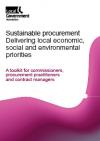
Executive summary
Sustainable procurement is a process whereby organisations meet their needs for goods, services, works and utilities in a way that achieves value for money on a whole life basis in terms of generating benefits not only to the organisation, but also to society and the local economy, whilst minimising damage to the environment.
Embedding sustainability into procurement can support the objectives of an organisation as set out in relevant policies and strategies and can be adapted to reflect the nature of the contract.
Many sustainability benefits can be achieved through supplier engagement before the procurement process begins which is essential to allow the market to understand and prepare their response to tender requirements.
Also key is the approach to selection of suppliers, the inclusion of relevant and proportionate requirements in the specification, the evaluation of relevant and proportionate award criteria, and an effective contract management process.
Mobilising procurement to deliver local priorities
The role of commissioning, procurement and contract management in delivering local and national priorities is set out in the ‘National procurement strategy for local government in England’ and been reinforced in the UK Government Green Paper ‘Transforming public procurement’ and the subsequent National procurement policy statement.
This highlights the delivery of social value and sustainable procurement, including economic, social and environmental outcomes, such as:
- creating new businesses, new jobs and new skills in the UK
- improving supplier diversity, innovation and resilience
- tackling climate change and reducing waste.
The UK has already put in place mechanisms to increase sustainability and social value to deliver economic, social and environmental outcomes from the procurement of goods and services - these include the Public Services (Social Value) Act 2012, the UK Climate Change Act, Equality Act, Modern Slavery Act and others.
As a result of this councils will need to effectively mobilise procurement to deliver relevant local priorities. Priorities will include targets to achieve ‘net zero’ or be ‘carbon neutral’, reducing consumption and waste, and inclusive local economic development.
The role of councillors and chief executives
As key decision makers, chief executives, leaders and councillors have a vital role in ensuring commissioning, procurement and contract management is used effectively to deliver local priorities. All those involved in setting policy and budgets, designing and commissioning services and setting specific procurement requirements, for example, need to consider:
- Does policy reflect the above obligations, challenges and other local priorities?
- Has sufficient time and effort been invested early enough to identify a solution which locks in best value for money and the most positive social and environmental outcomes?
- Has this been carried out in conjunction with internal stakeholders; such as heads of service, heads of planning and subject matter experts – such as climate change, procurement, contract and supplier managers and others, and with local and other potential suppliers and other public bodies?
The role of councillors is highlighted in ‘A councillor’s guide to procurement: 2019 edition’ and the ‘Local pathway to net zero – workbook for councillors’.
